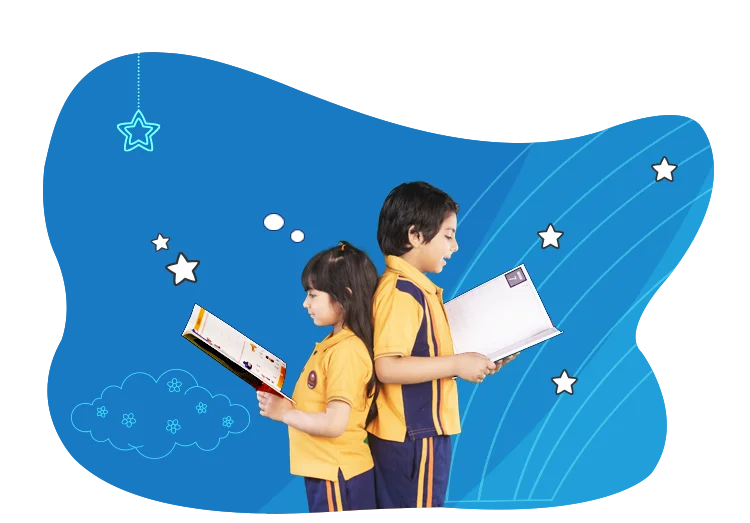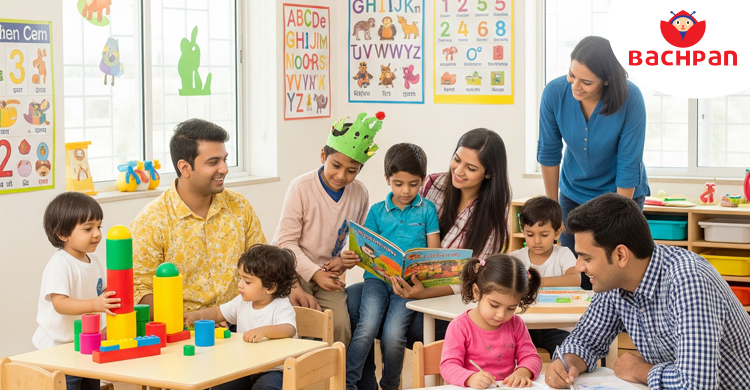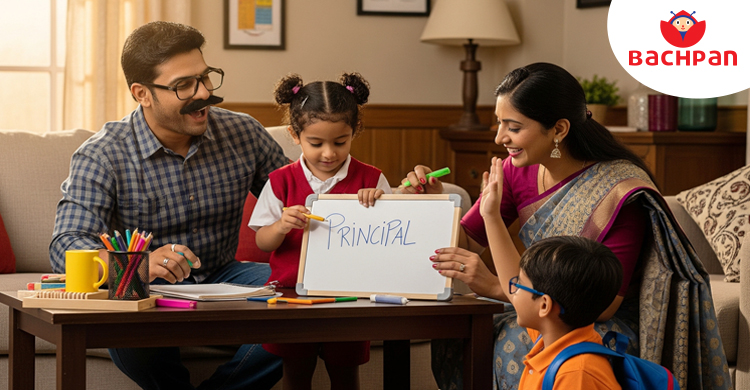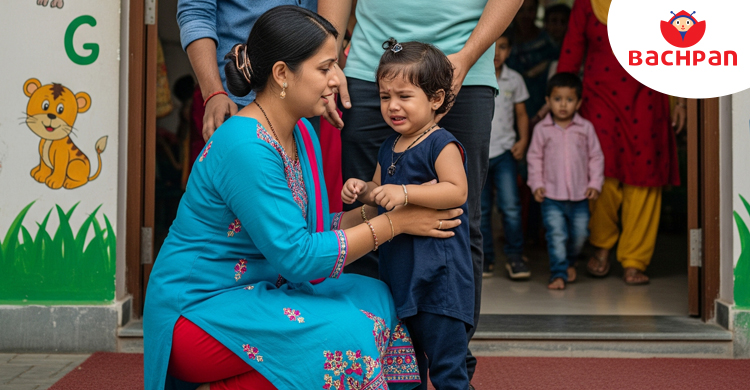How to Prepare Your Child for Their First Day at Preschool

The first day at preschool is a special and emotional moment for both the child and the parents. This is the first time the child steps out of the house and spends a few hours without you. Here’s what that moment looks like…
Parent: Ready for your big day, champ?
Child: Will you wait for me?
Parent: Always!
Later that day…
Child: Mama! I made a new friend, and we painted together!
Parent: I knew you would have the best day!
Read on for smooth transition tips that will benefit you and your child as well.
While preparing for the first day at preschool is important, it starts with choosing the right preschool. If you’re still deciding, check out our complete guide: The Ultimate Guide to Choosing the Right Preschool for Your Child ↗
Understanding the First Day at Preschool
When you know what to expect on the first day of preschool, you feel more mentally prepared. Let’s explore why the first day of preschool is significant and the typical emotions kids experience on their first day.
Why the First Day of Preschool Matters
The first day of preschool is important because it sets the tone for the entire school year. Positive early experiences can spark a lifelong tone for learning and exploration. Children are introduced to classroom routines, including group activities and structured learning sessions. They get to interact with teachers and other kids as well. If you’re still wondering why preschool is important and how it benefits young learners, here’s a complete guide on the Importance of Preschool and Its Key Benefits.
Common Emotions Kids Face on Day One
It is usual for children to feel mixed emotions on their first day of school. They might feel anxious, scared, and excited all at once. Some children may be eager to make new friends and explore a new environment, while others may feel unsure of what to expect, or when separated from their parents, they might feel restless.
Preschool Preparation Tips for Parents
Here are some preschool preparation tips for parents. Let’s check them out! Your child’s first day of school will be smooth and joyful if you follow these easy steps to help ease the transition.
Talk Positively About Preschool
Children develop a positive attitude when their parents speak well of preschool. They feel confident and excited to meet new people and make friends. Children develop a positive self-concept that encourages them to engage in activities and participate in learning. It also leads to a strengthened parent-child bond as it creates space for open and positive communication about preschool with your child.
Preschool Morning Routine Checklist
Here is the preschool morning routine checklist for you and your little one!
1. Wake up on time
2. Brush teeth and wash face
3. Use the bathroom
4. Get dressed in a comfy outfit
5. Eat a healthy breakfast
6. Pack snacks and a water bottle
7. Double-check backpack (essentials & comfort item)
8. Put on shoes
9. Hugs, positive words, and a quick goodbye
Pro Tip: A confident day starts with a calm start, so remember to go over your preschool morning routine checklist the night before!
Visit the School Together Beforehand
Visiting the school with your child beforehand prepares them for transition. It helps them become familiar with the school environment, teachers, and classmates. It creates a positive association with learning and playing in a new environment. Moreover, your child will feel at ease if introduced to the teachers beforehand, as they will know who will take care of them during the day.
Teaching good habits for kids at home can make the transition to preschool much smoother and help children adjust quickly.
Fun Preschool Preparation Activities at Home
Yes, here are some fun preschool preparation activities at home for your child!
Role-Play School at Home
You can create a fun and engaging learning environment by setting up a “pretend school” space. Arrange the items such as a whiteboard, crayons, tables and chairs, and paper, to mimic a classroom setting. You can also use simple drawings and pictures to represent various activities in the “school” day, such as art, snack time, and story time.
You can also try engaging your child in creative learning activities like coloring or drawing to build confidence before preschool starts.
Read Books About Going to Preschool
Reading books about going to preschool to your child is a great way to prepare them for their first day at preschool. Stories such as “Preschool Day Hooray!” by Linda Leopold Strauss help the child understand routines, build confidence, and get excited about the experience. Select relatable characters, talk about the story, and highlight the fun parts.
Create a Visual Routine Chart
A visual routine chart helps your child ease into preschool. Display pictures and simple words to depict daily tasks like brushing, getting dressed, and packing the bag. Visual routine charts build predictability and make the transition smoother. As a result, children feel more confident and ready for preschool day.
What to Pack for the First Day of Preschool
Your child’s first day at preschool? Pack the essentials, back-up plans, and a little bravery (both yours and theirs). It’s a survival kit for small adventures and big emotions, not just a bag!
Clothing, Snacks, and Essentials
A comfortable outfit, easy-to-eat snacks, and must-haves like a water bottle make sure your child is content, nourished, and prepared to enjoy their first day of preschool. Give everything a clear label and avoid overpacking to prevent carrying a heavy bag. Focus on items that support comfort, hygiene, and routine.
Comfort Items That Help Reduce Anxiety
A soft blanket, your child’s favourite toy, or a family photo eases the child’s first day of preschool jitters. Familiar objects offer emotional security as the kid feels connected to home. It is okay to pack one small comfort item that brings a smooth and confident transition into the preschool environment for your child.
How to Handle Separation Anxiety
When children go to school for the first time, they feel separation anxiety, which is very common. Do not worry, we are here to guide you through it.
Quick Goodbyes and Positive Affirmations
Prolonged goodbyes can increase the reluctance in children to go to school. Hence, short and sweet goodbyes, along with positive affirmations, lead to smoother drop-offs. A warm hug and words like, “I’ll be right here after school,” reassure the child and build trust in the new routine.
Consistency in Drop-Off Routine
The key to handling separation anxiety is following a consistent drop-off routine. Following the same steps each morning, like a hug, a cheerful goodbye, and reassuring phrases, helps the child know what to expect. This predictability helps your child in settling into the new routine of going to school.
Final First Day of Preschool Essentials Checklist
Be sure that nothing is overlooked! Here is your go-to preschool essentials checklist.
1. Comfortable, weather-appropriate outfit
2. Spare change of clothes
3. Easy-to-eat snacks
4. Filled water bottle
5. Backpack
6. Comfort item
7. Extra diapers and wipes (if applicable)
8. All items are clearly labeled
9. Big smiles, hugs, and a quick, positive goodbye!
Conclusion
For both you and your child, a new chapter begins on the first day at preschool. Preschool is a big step, and it’s crucial to approach it with positivity, patience, and consistency. Every little effort, from carefully handling goodbyes to packing the necessary items, makes your child feel secure and ready. Soon, with your help and encouragement, they will eagerly anticipate each school day with excitement, curiosity, and increasing self-reliance. Haven’t started preparing yet? Start with these 6 ways to prepare your child for preschool.
If you’re still in the admission stage, check this handy preschool admission checklist to make the process smooth and stress-free.






